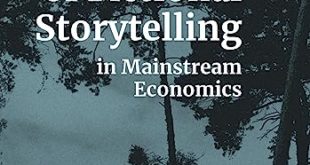from Lars Syll Fitting a model that has a parameter called ‘probability’ to data does not mean that the estimated value of that parameter estimates the probability of anything in the real world. Just as the map is not the territory, the model is not the phenomenon, and calling something ‘probability’ does not make it a probability, any more than drawing a mountain on a map creates a real mountain … In summary, the word ‘probability’ is often used with little thought about why, if at all,...
Read More »No, AI does not pose an existential risk to humanity
from Blair Fix In the last few months, there have been a string of open letters from tech leaders warning that artificial intelligence could lead to a ‘profound change in the history of life on Earth’. According to some insiders, AI poses an extinction risk, on the same level as pandemics and nuclear war. I think this scaremongering is nonsense. It plays into popular science fiction tropes about machines conquering humanity. But the problem with these scenarios is that when you look at...
Read More »AI, job loss, and productivity growth
from Dean Baker Fear the rich, not AI It is really painful to see the regular flow of pieces debating whether AI will lead to mass unemployment. Invariably, these pieces are written as though the author has taken an oath that they have no knowledge of economics whatsoever. The NYT gave us the latest example on Sunday, in a piece debating how many jobs will be affected by AI. As the piece itself indicates, it is not clear what “affected by AI” even means. What percent of jobs were affected...
Read More »new WEA book: “The Poverty of Fictional Storytelling in Mainstream Economics”
Kindle $4.99 Paperback $11.99 “No one does more than Lars Syll to identify and communicate the limitations of modern economics. An impassioned call and compelling sustained argument for economists to stop dwelling on the intricacies of irrelevant models and concern themselves with rest of the social reality.” – Tony Lawson, Cambridge University “Lars Syll’s new book gets to the heart of what’s methodologically wrong with mainstream economics and maps out foundations for a critical...
Read More »Brainstorming: negative impact of economics
from Asad Zaman and the WEA Pedagogy Blog In my previous post (The Religion of Economics), I explained why economic is a religion, even though it claims to be a science. This religion preaches a toxic morality, where the goal of life is maximization of personal pleasure, with no moral or social constraints. Some months ago, I read an article which suggested that we should do a cost/benefit analysis of economic theory itself – how much harm it has caused, versus any benefits that it has...
Read More »Recreational vehicles and magazines: what’s up since the pandemic
from Dean Baker Now that we have inflation beat, it seems like a good time to look at what has changed since the pandemic. A full catalog of how the USA is different would be a serious undertaking, but we can learn a lot just by examining how consumption patterns have changed over the last three years. These data are readily available from the Commerce Department’s website. Losers in the Post-Pandemic Period Some of the changes in consumption patterns are obvious. The increase in working...
Read More »Revealed preference theory — much fuss about nothing
from Lars Syll Thirty years ago yours truly wrote an article on revealed preference theory that got published in History of Political Economy (no. 25, 1993). Paul Samuelson wrote a kind letter and informed me that he was the one who had recommended it for publication. But although he liked it a lot, he also wrote a comment — published in the same volume of HOPE — saying: Between 1938 and 1947, and since then as Pålsson Syll points out, I have been scrupulously careful not to claim for...
Read More »Victoria Chick, 1936-2023 in memoriam
from Jesper Jespersen Personal recollection How I met Vicky I was on a one year sabbatical leave at Cambridge University, King’s College by invitation of Professor Wynne Godley in the year 1988/89. Seriously speaking I was surprised, because except for Godley there were only few economists left at the Faculty, who called him-/herself Keynesian. The old guard of Keynes’ disciples had disappeared: Joan Robinson and Nicholas Kaldor were no longer alive; Richard Kahn very fragile....
Read More »Owning up to mistakes and pandemic deaths
from Dean Baker We should be able to work together for the benefit of humanity. John Kerry got the start to his political career when he testified to Congress about the Vietnam War as an anti-war veteran, and asked, “How do you ask a man to be the last man to die for a mistake?” The point, of course, was that we were still sending soldiers to Vietnam to fight and risk dying in a war that was widely recognized to be pointless. Rather than just owning up to the mistake, we continued the...
Read More »India’s central bank launches new campaign against cash
from Norbert Häring India’s central bank will withdraw the largest banknote from circulation. The then largest note is only worth about as much as the smallest in the euro area. The move is intended to force people to use electronic money instead of cash. With this, they can be better monitored and controlled and the financial and IT industries get their percentages and data with every purchase. India, as a favorite guinea pig of the global cash abolitionists, often provides the blueprint...
Read More » Real-World Economics Review
Real-World Economics Review



